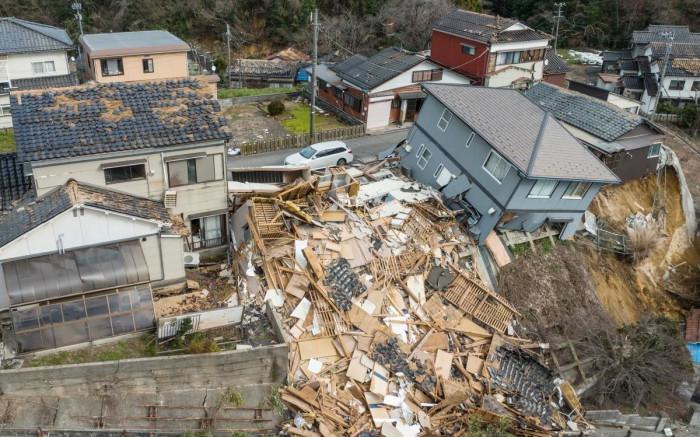
Rescuers searched through the rubble on Saturday as the focus turned to recovering bodies rather than searching for survivors, five days after a powerful earthquake hit central Japan that has since been confirmed to have killed 98 people.
This aerial photo shows damaged and destroyed houses along a street in Wajima, Ishikawa Prefecture, on January 2, 2024, a day after a massive 7.5-magnitude earthquake struck the Noto region of Ishikawa. (Photo by Fred MERY / AFP)
SUZU – Rescuers searched through the rubble on Saturday as the focus turned to recovering bodies rather than searching for survivors, five days after a powerful earthquake hit central Japan that has since been confirmed to have killed 98 people.
The death toll from the magnitude 7.5 quake on New Year’s Day was certain to rise. Authorities said 211 people were still missing in the Ishikawa region on Japan’s main island of Honshu.
The work of thousands of rescue workers was made difficult by bad weather – snow was forecast for Sunday – as well as roads torn apart by gaping cracks and fallen trees and stones.
Two elderly women were rescued from the rubble of their homes on Thursday, but there has been no cause for celebration since then.
In Suzu, where dozens of houses lie in ruins, a dog barked on Friday while an AFP team filmed the cleanup effort – a sign of a grim discovery.
“Training for disaster rescue dogs begins with something similar to a game of hide-and-seek,” dog trainer Masayo Kikuchi told AFP.
“They are finally being taught to bark if they see a person under the rubble.”
Homes with discovered fatalities are marked and left alone until a coroner can come with relatives to identify the body.
In the port city, fishing boats were sunk by tsunami waves or lifted ashore like toys, with one person also reportedly swept away.
In nearby Wajima, a major fire destroyed hundreds of buildings and collapsed a seven-story building on the first day.
“I was relaxing on New Year’s Day when the quake happened. My relatives were all there and we had fun,” said Hiroyuki Hamatani, 53, amid burned-out cars and toppled telegraph poles.
“The house itself is standing, but it is far from habitable now… I don’t have the space to think about the future,” he told AFP.
“GIVING OUR BEST”
Authorities said on Saturday morning that 211 people were missing, while 222 had previously been counted.
The death toll rose from 94 to 98, and more than 450 people were injured. The dead reportedly included a middle school student who was visiting his family.
In the Ishikawa region, around 23,800 households were without electricity and more than 66,400 households were without running water. Power and water outages also affected hospitals and facilities for the care of the elderly and disabled.
More than 31,400 people are housed in 357 state-run shelters. Many communities were still isolated.
“We are doing our best to carry out rescue operations in the isolated villages… However, the reality is that the isolation has not been resolved to the extent we would like,” regional governor Hiroshi Hase said on Friday.
Japan experiences hundreds of earthquakes every year, most of which cause no damage because of strict building regulations that have been in place for more than four decades.
The country was hit by a massive 9.0-magnitude underwater earthquake in 2011, which triggered a tsunami that left about 18,500 people dead or missing.
It also flooded the Fukushima nuclear power plant, causing one of the worst nuclear disasters in history.






Recent Comments